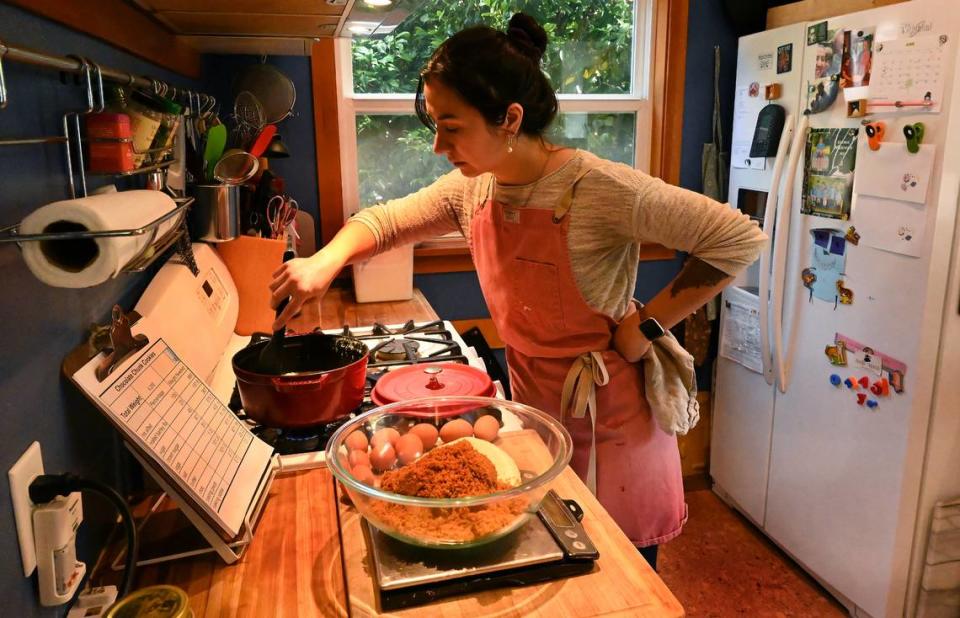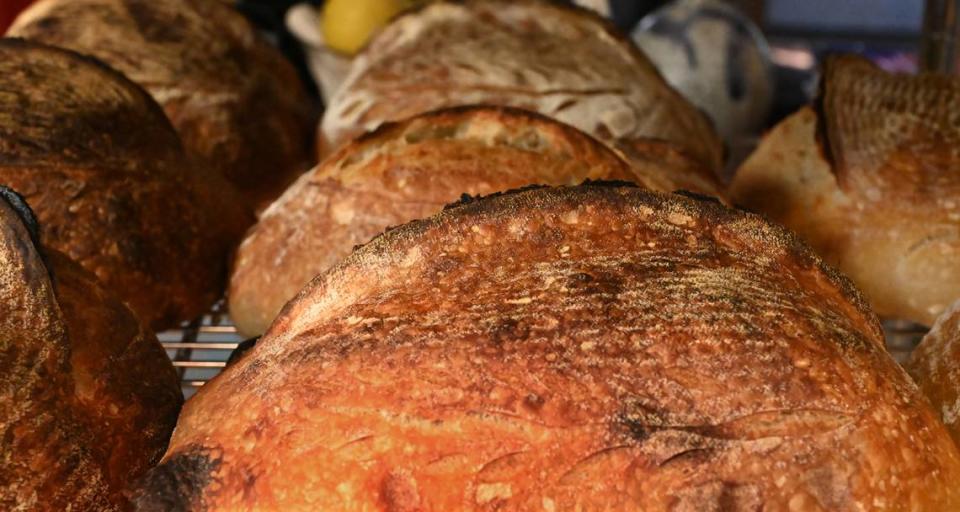This West Olympia woman bakes and sells ‘community-supported’ bread out of her home
In her words, Meg Chernoff’s Folk Bread is a smaller-than-small microbusiness.
A baker since childhood, Chernoff has worked for several restaurants, coffee shops and small businesses in the Pacific Northwest, where she fell in love with serving local communities. When she heard about a community of people in the region growing local grains and milling and using local wheat, Chernoff knew she wanted to be a part of it.
For almost four years now, she has been the owner, baker and sole employee of her own small business: Folk Bread, a cottage food bakery she runs out of her west Olympia home. Her bread, naturally leavened and made of locally produced ingredients, is bought by people from all over the Olympia area.
In addition to naturally leavened bread, also known as sourdough, Chernoff makes pastries and other baked goods.

“It’s a staple food for all of humanity, some kind of bread, and I think it gives us a connection as human beings,” Chernoff told The Olympian. “And if that connection ends with the baker, and the flour itself is still this anonymous white powder that came from somewhere you don’t know about, I feel like that is missing another connection.”
Folk Bread was one of eight South Puget Sound businesses to receive a Snail of Approval Award from the Slow Food Greater Olympia chapter earlier this year.
Slow Food awards a Snail of Approval to businesses that hold the Slow Food movement’s values: good, clean and fair food. In other words, businesses whose food not only tastes good, but is sustainably and equitably made for as many as possible.
“The award is given to food-related businesses that are striving toward those goals,” Jennifer Crain, Slow Food Greater Olympia chair, told The Olympian. “So a lot of these businesses ideally hold the same values, and they are acting on those values.”
From the fields to Folk Bread
Most of Chernoff’s ingredients come from two mills: Camas Country Mill in Oregon’s Willamette Valley and Cairnspring Mills in the Skagit Valley of northwest Washington.
Both work with local farms that use regenerative agricultural practices to grow wheat. When Chernoff does not get ingredients from them, she gets them from other, smaller local farms. Ingredients that are not local, such as the chocolate Chernoff sources from Peru, are fair-trade certified. Some of Chernoff’s ingredients are also organic.
“Washington grows amazing produce throughout more than half of the year,” Chernoff said. “And the rest of it comes from not that far away.”
Camas Country Mill and Cairnspring Mills both stone mill, one of humanity’s oldest means of grinding grains. In stone milling, grain feeds into two stones — one stationary and one turning — and comes out with most of its vitamin- and fiber-rich natural oils and bran still intact.
Since the Industrial Revolution introduced roller milling, most American white flour has exchanged its vitamins and fibers for a longer shelf life.
The flour Chernoff uses has not. Sometimes, she even grinds grains herself with her own at-home stone mill.

“These farmers are going to an incredible length to grow this beautiful, regeneratively grown wheat,” Chernoff said. “To then take away two-thirds of the benefits of it seems like such a waste and terrible for our bodies.”
Her process
Chernoff’s week starts on Tuesday mornings, when she feeds her sourdough starter and grows it so she has more to leaven her bread with the next day. By evening, Chernoff also has some ingredients prepped.
After she drops her daughter off at child care on Wednesday mornings, Chernoff puts the first set of ingredients in her mixer and, from 9 a.m. on, is prepping and mixing ingredients until 2 p.m. At any given moment, Chernoff said she may be toasting walnuts, mixing dough, washing dishes or otherwise doing “10 things at once” until she shapes the doughs from 2 to 4 p.m.
“It’s different every week,” Chernoff said.

Then, Chernoff proofs the doughs, sitting them at ambient temperature for a few hours before putting all but the rye dough in her fridge overnight.
“That gives a really nice sourdough flavor and it also gives it a really nice leavening,” Chernoff said. “And it’s nice and springy in the morning.”
She starts baking as early as 5:30 a.m. on Thursdays and, after finishing at 7:30 or 8 a.m., lets her breads cool for a couple of hours. At about 10 or 10:30 a.m., she packages and drops it off at Folk Bread’s five pick-up locations in west Olympia, East Olympia, the Carlyon neighborhood, Ken Lake and Tumwater.
By 2 p.m., as many as 40 loaves of bread are ready for Chernoff’s customers to pick up by 7 p.m. Among their orders are pain au levain, city rye bread with caraway, cinnamon raisin bread and honey and olive oil bread, in addition to pastries and other baked goods such as cardamom buns and barley chocolate chunk cookies.
One of Chernoff’s customers, Kendall Farley, has been ordering from her almost as long as she has run Folk Bread.
“I can just taste the difference between really quality, local, good ingredients,” Farley told The Olympian. “It’s easy to get pretty quality bread out there, if you know what you’re looking for. Hers is definitely top notch.”
Community-supported bread
Chernoff calls the bread she makes CSB: community-supported bread, a model based on CSA, or community-supported agriculture.
Her customers order their food ahead of pick-up via subscriptions, giving Chernoff a stable income and them weekly loaves without weekly re-orders. And by knowing what and how much Chernoff is baking, none of her food is wasted.
“In a typical bakery model, you bake the most you could possibly sell, and then either try and sell day-old food at a discount the next day, or throw it away, or donate, whatever,” Chernoff said. “And so I’m able to not have that waste.”
For customers who cannot afford a subscription, there is the Community Funded Membership: a free subscription for bread paid for by other customers with the Pay It Forward Membership. Folk Bread may be a small business with high standards, but Chernoff said she tries to keep her food accessible.
“Balancing high-quality product and ingredients with accessibility is an ongoing challenge for me and for all bakers that I know, honestly,” Chernoff said. “All the people in this region that are trying to make a really high-quality product, but get it into the hands of people who want and need it.”

Chernoff’s CSB helped her win the Snail of Approval Award from the Slow Food Greater Olympia chapter. But she only applied for the award after Crain, a friend and longtime customer of hers on the Slow Food board, recommended it.
Despite Chernoff’s belief that Folk Bread was “too small” to receive the award, it did.
Folk Bread’s food not only tastes good, but is locally produced, low-waste and accessible, said Crain, who recused herself from the interview part of the Snail of Approval Award process. All of that aligns with the Slow Food movement’s values.
“I see in her business evidence of all three of the areas that we really care about,” Crain said. “The food tastes delicious, of course. But beyond that, it’s produced in a way that is good, or at least better for the planet than other options that she has out there. And it’s also more fair.”
Chernoff’s customers place their orders on Folk Bread’s website. While she mainly emphasizes her subscriptions, Chernoff also takes a la carte orders, which open at 8 a.m. on Sundays and close at 6 p.m. on Tuesdays. She vends at the West Olympia Farmers’ Market, which is open from 10 a.m. to 3 p.m. on Saturdays at West Central Park.
Folk Bread’s Snail of Approval Award is on display in a window toward the back of Chernoff’s kitchen.
“I was so proud to get that,” Chernoff said. “I’ve never won an award before.”


